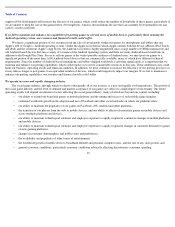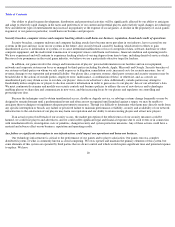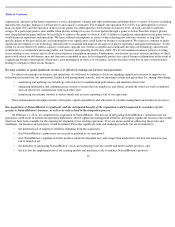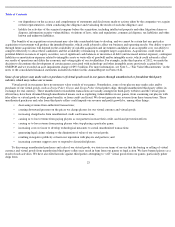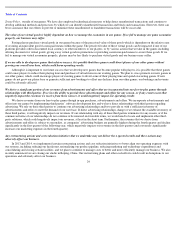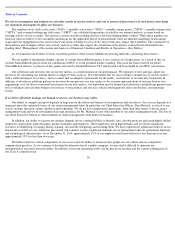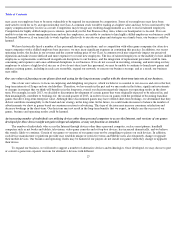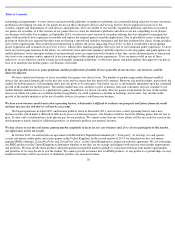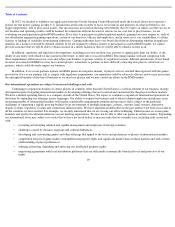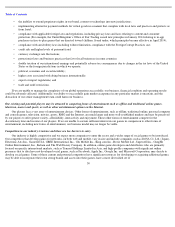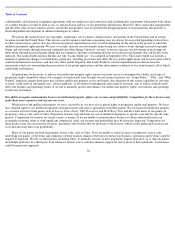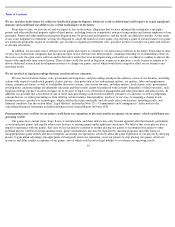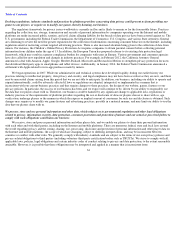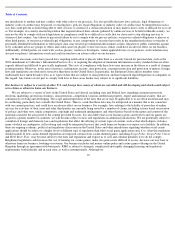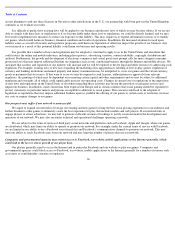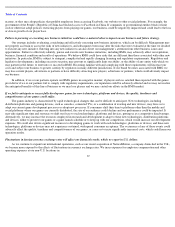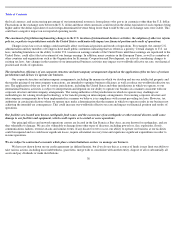Zynga 2014 Annual Report Download - page 32
Download and view the complete annual report
Please find page 32 of the 2014 Zynga annual report below. You can navigate through the pages in the report by either clicking on the pages listed below, or by using the keyword search tool below to find specific information within the annual report.
Table of Contents
In 2013, we decided to withdraw our application from the Nevada Gaming Control Board and made the focused choice not to pursue a
license for real money gaming in other U.S. jurisdictions at this time in order to focus our resources and priorities on what we believe is our
biggest opportunity, free to play social games. Our decision may not result in the long-term benefits that we expect, in which case the success of
our business and operating results could be harmed. In connection with our decision to refocus on our core free to play business, we are
evaluating our participation in global RMG markets. If we elect to participate in global regulated markets, gaming laws may require us, each of
our subsidiaries engaged in gaming operations, certain of our directors, officers and employees, and in some cases, our stockholders, to obtain
licenses or findings of suitability from gaming authorities. Gaming authorities have very broad discretion in determining whether an applicant
qualifies for a license or should be deemed suitable. If we are required to obtain a license to participate in a global RMG market, we cannot
provide assurance that we will be able to obtain a license in a timely fashion or that we will be able to obtain a license at all.
In addition, regulatory and legislative developments, including excessive taxation, may prevent or significantly limit our ability, or the
ability of any entity with which we may partner in the future, to enter into or succeed in RMG. Becoming familiar with and complying with
these requirements will increase our costs and subject our business to greater scrutiny by regulators in many different jurisdictions. If our brand
becomes associated with RMG we may lose current players, advertisers or partners or have difficulty attracting new players, advertisers or
partners, which could adversely impact our business.
In addition, if we or our partners operate our RMG games in a negative manner, if players are less satisfied than expected with the games
provided or if we or our partners fail to comply with regulatory requirements, our reputation could be adversely affected and we may not realize
the anticipated benefits of this line of business or we may lose players and we may curtail our efforts in the RMG market.
Our international operations are subject to increased challenges and risks.
Continuing to expand our business to attract players in countries other than the United States is a critical element of our business strategy.
An important part of targeting international markets is developing offerings that are localized and customized for the players in those markets.
We have a limited operating history as a company outside of the United States. We expect to continue to expand our international operations in
the future by expanding our offerings in new languages. Our ability to expand our business and to attract talented employees and players in an
increasing number of international markets will require considerable management attention and resources and is subject to the particular
challenges of supporting a rapidly growing business in an environment of multiple languages, cultures, customs, legal systems, alternative
dispute systems, regulatory systems and commercial infrastructures. We have experienced difficulties in the past and have not been successful in
all the countries we have entered. For example, we recently announced that we are closing our office in Beijing, China because its recent game
launches and product localization initiatives are not meeting expectations. We may not be able to offer our games in certain countries. Expanding
our international focus may subject us to risks that we have not faced before or increase risks that we currently face, including risks associated
with:
29
•
recruiting and retaining talented and capable management and employees in foreign countries;
•
challenges caused by distance, language and cultural differences;
•
developing and customizing games and other offerings that appeal to the tastes and preferences of players in international markets;
•
competition from local game makers with intellectual property rights and significant market share in those markets and with a better
understanding of player preferences;
•
utilizing, protecting, defending and enforcing our intellectual property rights;
•
negotiating agreements with local distribution platforms that are sufficiently economically beneficial to us and protective of our
rights;


